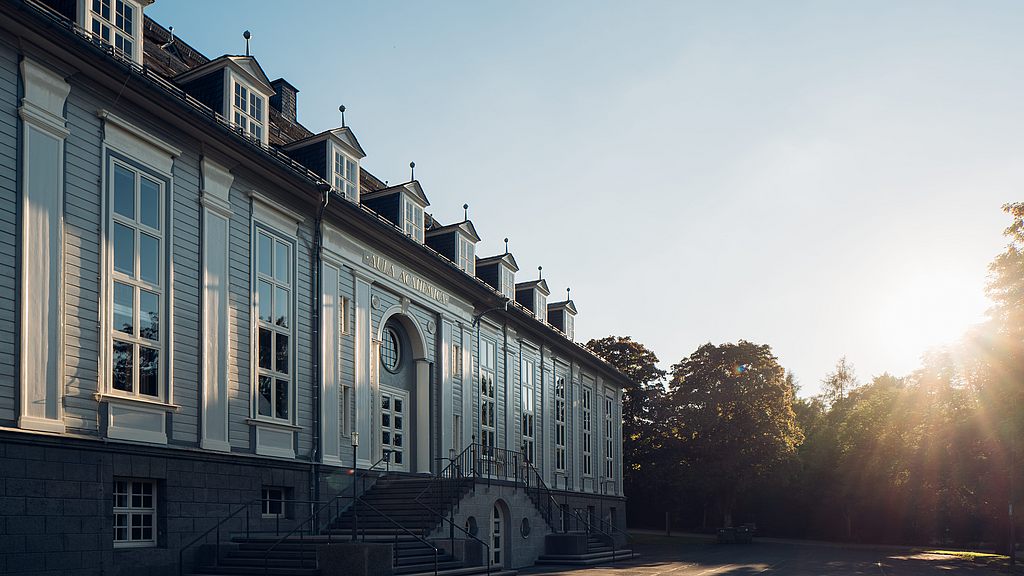About us
Welcome to Clausthal University of Technology
TU Clausthal (TUC) is a leading research university and is exceptionally well-connected worldwide. This is evidenced by its high volume of third-party resources and the many successful partnerships it maintains with universities, research institutions, and businesses in the region, across the country, and throughout the world. Around 85 professors, 3,000 students, and some 1,100 employees enjoy short distances between the places they need to be, one another’s personal attention, and the varied landscapes of the Upper Harz amid sites of UNESCO World Heritage.
TU Clausthal is the most significant factor in the region’s economy and its largest employer. There is close collaboration between the academic and private sectors, facilitating the journey from fundamental research to real-life applications. And the overarching theme across all this work is the circular economy. In comprehensively pursuing the principle of a resource-efficient, regenerative economic order, TU Clausthal is taking responsibility for the future. With climate change and digitalization under way, it aims to support the establishment of a sustainable society.
TU Clausthal’s degree programs can often be found in the top tier of the CHE ranking. With approximately 50% of its students from outside Germany, representing more than 100 different countries, TU Clausthal is the epitome of internationalism. Alongside this cosmopolitanism, the cornerstones of the university’s vision for the future comprise a pronounced focus on practical application, outstanding levels of attentive support for students, and the involvement of broader society.
TU Clausthal is divided into three faculties, 29 institutes, and six interdisciplinary research centers. Apart from its main location in Clausthal-Zellerfeld, the university has two additional sites, namely its Energy Campus in Goslar and the Drilling Simulator Celle – German Center for High Performance Drilling Technology and Automation.
Beyond that, students and employees enjoy the international atmosphere at Clausthal University of Technology, the extensive nature of the Harz Mountains and the over 60 different sports ranging from skiing to sailing and mountain biking offered by the Sports Institute.
TU Clausthal’s research profile
Our research, teaching, and technology transfer are all part of the interdisciplinary endeavor to tackle the great challenge facing our society: to safeguard the sustainable supply of resources and advance the transformation of our energy system under the onset of climate change. The spotlight is on systemic approaches to the creation of a circular economy.
Next to its narrow definition as an economic order that minimizes waste, the circular economy also encompasses renewable energy and digital management of the whole system. Digitalization has special significance, since it is the only means by which industrial processes designed for the linear system can be successfully transformed to suit a circular one. The problem-solving work is grounded in the academic disciplines of mathematics and computer science, natural sciences, engineering, business, and economics. Additionally, combining knowledge of materials with understanding of processes is one of TU Clausthal’s key capabilities, which radiates into all its research areas. The university has organized the totality of its research activities into four areas:
- Sustainable Energy Systems
- Raw-Materials Supply and Resource Efficiency
- Sustainable Materials and Processes
- Digitalization for a Sustainable Society
Under the umbrella of the circular economy, interdisciplinary and closely dovetailed study is engaged in within and across the research areas. The six research centers at TU Clausthal provide an ideal platform for this in practice. The research areas and the focused, consistent work on their continuous strategic development form the basis of our university’s outstanding visibility on the national and international stage.
The holistic view inherent in the circular economy addresses not only technological but also behavioral and economic issues. The three dimensions of sustainability – environmental, social, and economic – are essential to the transition of our energy and raw-materials systems and to the necessary transformation of society. For that to succeed, public approval of the proposed technological solutions and sustainable business models is indispensable. This aspect is actively included in the processes of research and technology-transfer as well as teaching at TU Clausthal.
